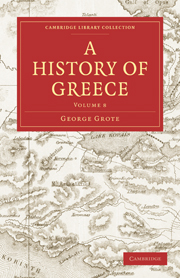Book contents
- Frontmatter
- PREFACE
- Contents
- CHAPTER LXII Twenty-first Year of the War.—Oligarchy of Four Hundred at Athens
- CHAPTER LXIII The Restored Athenian Democracy, after the Deposition of the Four Hundred, down to the Arrival of Cyrus the Younger in Asia Minor
- CHAPTER LXIV From the arrival of Cyrus the Younger in Asia Minor down to the Battle of Arginusæ
- CHAPTER LXV From the Battle of Arginusæ to the Restoration of the Democracy at Athens, after the Expulsion of the Thirty
- CHAPTER LXVI From the Restoration of the Democracy to the Death of Alkibiadês
- CHAPTER LXVII The Drama.—Rhetoric and Dialectics.—The Sophists
- CHAPTER LXVIII Sokratês
CHAPTER LXV - From the Battle of Arginusæ to the Restoration of the Democracy at Athens, after the Expulsion of the Thirty
Published online by Cambridge University Press: 05 October 2010
- Frontmatter
- PREFACE
- Contents
- CHAPTER LXII Twenty-first Year of the War.—Oligarchy of Four Hundred at Athens
- CHAPTER LXIII The Restored Athenian Democracy, after the Deposition of the Four Hundred, down to the Arrival of Cyrus the Younger in Asia Minor
- CHAPTER LXIV From the arrival of Cyrus the Younger in Asia Minor down to the Battle of Arginusæ
- CHAPTER LXV From the Battle of Arginusæ to the Restoration of the Democracy at Athens, after the Expulsion of the Thirty
- CHAPTER LXVI From the Restoration of the Democracy to the Death of Alkibiadês
- CHAPTER LXVII The Drama.—Rhetoric and Dialectics.—The Sophists
- CHAPTER LXVIII Sokratês
Summary
Alleged propositions of peace from Sparta to Athens—doubtful.
The victory of Arginusæ gave for the time decisive mastery of the Asiatic seas to the Athenian fleet; and is even said to have so discouraged the Lacedæmonians, as to induce them to send propositions of peace to Athens. But this statement is open to much doubt, and I think it most probable that no such propositions were made. Great as the victory was, we look in vain for any positive results accruing to Athens. After an unsuccessful attempt on Chios, the victorious fleet went to Samos, where it seems to have remained until the following year, without any farther movements than were necessary for the purpose of procuring money.
Eteonikus at Chios—distress of his seamen—conspiracy suppressed.
Meanwhile Eteonikus, who collected the remains of the defeated Peloponnesian fleet at Chios, being left unsupplied with money by Cyrus, found himself much straitened, and was compelled to leave the seamen unpaid. During the later summer and autumn, these men maintained themselves by labouring for hire on the Chian lands; but when winter came, this resource ceased, so that they found themselves unable to procure even clothes or shoes. In such forlorn condition, many of them entered into a conspiracy to assail and plunder the town of Chios; a day was named for the enterprise, and it was agreed that the conspirators should know each other by wearing a straw or reed.
- Type
- Chapter
- Information
- A History of Greece , pp. 285 - 397Publisher: Cambridge University PressPrint publication year: 2010First published in: 1850



